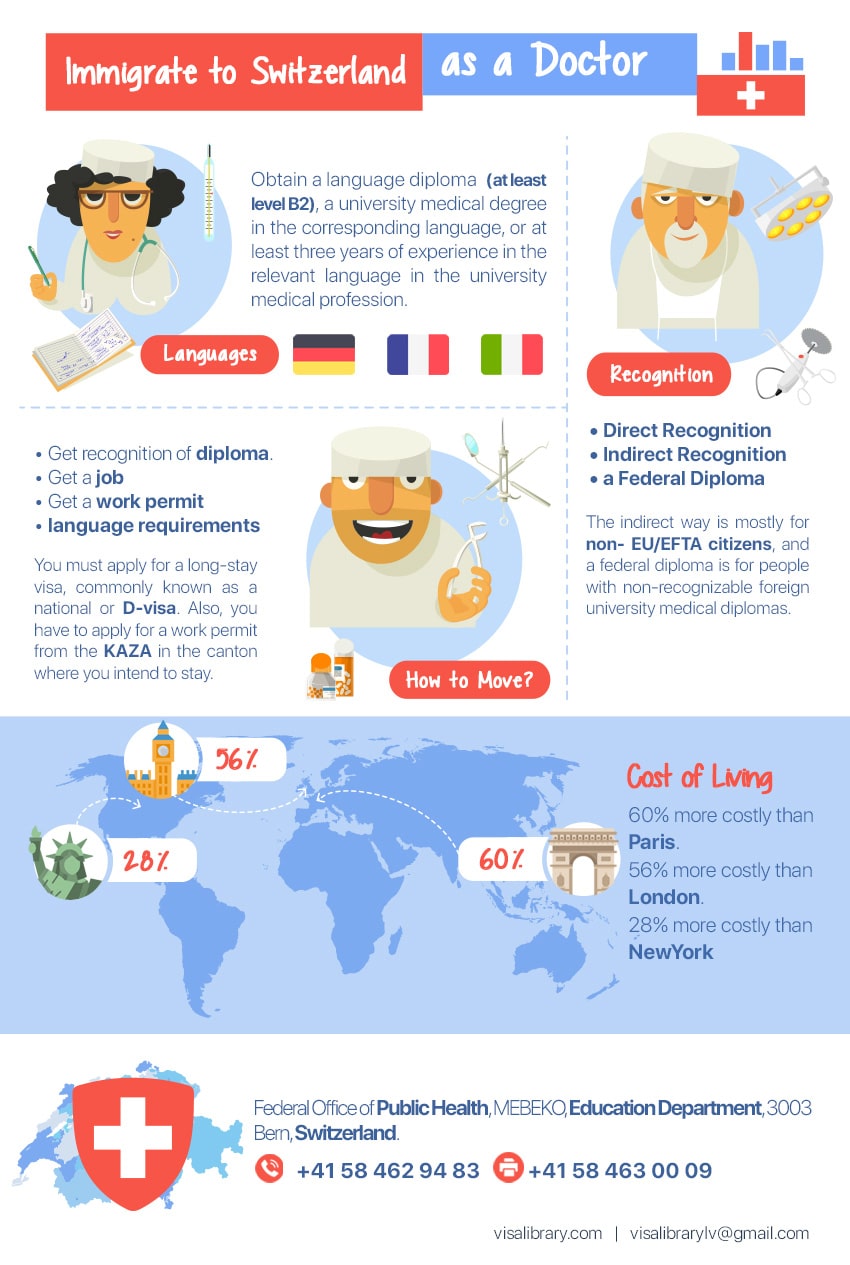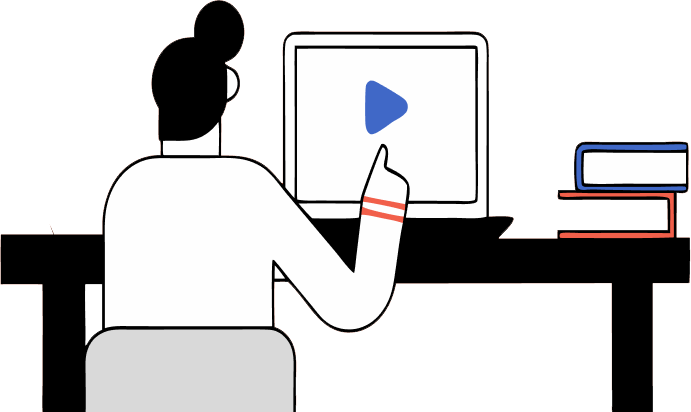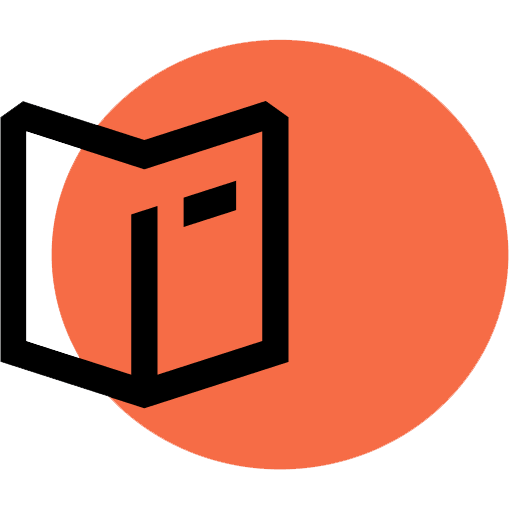Want to be a doctor in Switzerland?This guide breaks down How to become a doctor in Switzerland, including licensing, language skills, visas, and salaries.
How to Work as a Doctor in Switzerland?
Working as a doctor in Switzerland can be challenging, especially for non-EU doctors. Here are some requirements you need to have:
- Medical degree. You need to have a recognized medical degree that’s equivalent to a Swiss medical degree. The Swiss ENIC-NARIC Center usually assesses these degrees.
- Language proficiency. You must be fluent in one of 4 languages: German, French, Italian, or Romansh.
- Clinical experience. You may need 1 to 3 years of clinical experience after graduating, depending on the canton and regulations.
- Additional exams. Some Swiss cantons may require additional exams, like the Swiss federal medical exam, or assessments about Swiss healthcare practices and regulations.
- Diploma recognition. If you have a diploma from an EU/EFTA state, you’ll need to have it recognized for professional establishment in Switzerland.
Before diving into the specifics of medical licensing, it’s important to understand Switzerland’s position in Europe. As a member of the Schengen Area, visa and travel regulations are interconnected with neighboring countries. This can be advantageous for physicians looking to attend conferences or collaborate across borders. For a broader perspective on travel requirements for the region, you can find general information on visas for Europe.
If you’re planning to stay in Switzerland for more than three months, you’ll need to present a valid work and/or residence permit within eight days of moving. You can find detailed information on the requirements and application process for a Switzerland work visa online.
Make sure you know all about Switzerland visa requirements. You’ll also need to provide your identity card and a valid employment contract or confirmation from your employer.
Get the FREE Cheat sheet for
Move to Switzerland as a Doctor
Direct Recognition for EU/EFTA Doctors
You can apply for direct recognition if:
- You finished your diploma in an EU/EFTA state; or
- You are a citizen of an EU/EFTA state; or
- You are married to an EU/EFTA citizen.
Requirements for Direct Recognition of the Diploma
The following conditions must be met in order for an EU/EFTA diploma to be accepted in Switzerland:
- Have a Swiss, EU, or EFTA citizen as a partner or be a Swiss citizen.
- Diplomas and additional credentials must comply with EU Directive 2005/36/EG or the EFTA Convention, with authority granted by those directives or conventions.
Required documents:
- A dated and signed application form.
- Certified copies of your passport or ID, and those of your spouse (if applicable) along with a marriage certificate.
- A signed resume.
- Certified copies or official translations of your diploma(s) if not in German, French, Italian, or English.
Note: In specific countries (See the table below), you must also provide a certified copy of the certificate of conformity from the relevant authority, along with translations if the language of the issuance is not German, French, Italian, or English.
Bulgaria | Slovenia | Belgium | Slovakia |
Malta | Cyprus | Portugal | Denmark |
Estonia | Iceland | Sweden | Latvia |
Netherlands | Czech Republic | Lithuania | Romania |
Finland | Hungary | Norway | Great Britain |
Greece | Poland | Croatia | |
How to work as a foreign dentist in Switzerland? Make sure you read our article to know all about it.
Process of Indirect Recognition
You can use indirect recognition if your diploma was received outside the EU/EFTA but was previously legally recognized in an EU/EFTA state.
Requirements for indirect recognition of the diploma
You must meet the following requirements:
- You or your spouse are Swiss citizens or Swiss nationals living in an EU or EFTA country.
- An EU or EFTA nation has validated your diploma.
- In the previous 5 years, you have earned at least 3 years of clinical experience in Switzerland and/or the country of recognition.
- You have at least level B2 fluency in the official Swiss language.
Steps to Register a Foreign Medical Diploma in Switzerland
A doctor must obtain a federal diploma if the requirements of direct or indirect diploma recognition are unmet. The Medical Professions Commission (MEBEKO) decides on the requirements.
Requirements for the Registration of Non-Recognizable Diplomas
A non-recognized foreign diploma can be registered with the Medical Professions Register (MedReg) if it meets the following requirements:
- According to MedBG, foreign diplomas allow practice under professional supervision.
- These standards are met by overseas training:
- Doctors. You must complete at least 5,500 hours of theory and practice in six years of full-time study.
- Dentists. Studying full-time for five years or completing 5,000 hours of practical and theoretical training is required.
- Chiropractors. At least 5,500 hours of instruction and practice over six years of full-time study.
- Pharmacists. Study alternating theoretical and practical instruction for a minimum of five years.
- Veterinarians. Students must complete five years of alternating theoretical and practical instruction in a recognized university or college.
You must present the documents below for an examination by the MEBEKO:
- Current resume’
- Identity verification
- Certificate of Matura (plus official translation)
- Diploma (Including official translation)
- Names of examinations taken during the study (plus official translation)
- Detailed documentation of professional experience overseas, if available. These data include the duration, function, and level of employment. These documents must also be officially translated.
To work as a pharmacist in Switzerland, read our article to learn all about the process.
How to Get a Swiss Work Visa to Immigrate to Switzerland as a Doctor?
To immigrate to Switzerland as a doctor, follow these steps:- Acquire a valid medical degree and certifications in your field.
- Find steady work as a doctor in Switzerland.
- Show that you can communicate effectively in one of Switzerland’s recognized languages.
- Visit your country’s Swiss Embassy or Consulate to apply for a residence permit.
- Apply for a D-visa at the Swiss embassy if your intended stay is over 90 days.
- In most cases, your company will obtain your work permit from the Cantonal Medical Office on your behalf.
- If everything checks out, you can start your medical career in Switzerland.
The Swiss Job Market for Doctors
Jobs in Switzerland are listed on various websites. Apply for an “Assistenzarzt” position to become a Swiss doctor. Completing a significant test and speaking B2 German are required. Apply for an Assistenzarzt position at the BAG. Switzerland needs private practitioners, especially in rural areas. Though simple, opening a practice in Switzerland requires a medical license. Fluency in the local language is crucial, especially in rural areas with private practices.How Much is a Doctor’s Salary in Switzerland?
A doctor’s salary in Switzerland ranges significantly based on specialization, experience, and employment type:- Average Salary: Doctors earn between CHF 107,000 and CHF 492,000 annually.
- Entry-level Salary: Doctors typically earn around CHF 107,000, while more experienced doctors and specialists, particularly in fields like cardiology or surgery, can earn up to CHF 492,000 per year.
- Self-employed Doctors: On average, they tend to earn CHF 320,209 annually.
- Self-employed Surgeons: They can earn around CHF 502,000, and psychiatrists about CHF 214,000 annually.
For an Exploratory Visit
If you simply wish to visit the country to explore potential hospitals, cities, and get a feel for the lifestyle before beginning the formal application process, you would travel as a tourist. In this case, you would apply for a Switzerland Visitor Visa.
How to Immigrate to Switzerland as a Doctor?
Here is the relocation process for doctors immigrating to Switzerland:
Swiss Federal Office of Public Health (FOPH) Registration
First, gather all necessary documents (medical degree, transcripts, proof of completed internships, etc.), provide proof of language proficiency (German, French, Italian, or Romansh), complete the application form available on the FOPH website, and submit it along with your documents. The FOPH will evaluate your credentials, and upon successful evaluation, you will receive an official recognition certificate. The application fee ranges from CHF 800 to CHF 1200.
Cantonal Medical Association Registration
First, collect your recognized qualifications (proof of language proficiency, proof of residency, and identification), fill out the registration form provided by the Cantonal Medical Association in your canton, and submit the completed form along with the required documents. The association will verify your documents and once confirmed, you will receive a confirmation that allows you to practice in that canton. The fee typically ranges from CHF 200 to CHF 400.
Local Municipality Registration
Grab your residence permit and Switzerland visa and visit the local municipality office (Einwohnerkontrolle/Bureau de contrôle des habitants) to register your residence. Bring your passport, work permit, housing contract, and the registration form to complete the process. After submitting these documents, you will be officially registered in the local municipality. The fee ranges between CHF 20 and CHF 50.
Swiss Medical License Application
First, obtain the application form from the cantonal health authority in your chosen canton. Prepare the required documents (recognized qualifications, proof of language proficiency, proof of residency, etc.), and submit the completed application form and documents to the cantonal health authority. Your application will be assessed, and once approved, you will receive your Swiss medical license, enabling you to practice medicine in Switzerland. The fee generally ranges from CHF 500 to CHF 700.
Settling in Switzerland
- Banking: You need to open a bank account. Presenting your passport, proof of residency, and work contract. Famous banks include UBS, Credit Suisse, PostFinance, and Zürcher Kantonalbank.
- Housing: You can search for rental properties, arrange viewings, and sign a rental agreement. Famous housing websites include Homegate.ch, Immoscout24.ch, Comparis.ch, and Immostreet.ch.
- Health Insurance: You need to choose a health insurance plan and enroll within three months of arrival. Famous insurance providers include Helsana, CSS, Swica, and Sanitas.
- Cost of Living: The monthly expenses for doctors in Switzerland can range from CHF 4,000 to CHF 8,000, depending on the city and lifestyle.
Relocating with Your Family
A crucial part of relocating for many professionals is bringing their family. Once you have secured your work permit and are cleared to move to Switzerland, your spouse and dependent children can apply to join you. This process is managed through the Switzerland Family Visa, which has its own set of requirements and procedures.
Continuing Education and Integration Tips
- Attend accredited medical courses, conferences, and workshops. Maintain an updated record of your continuing education credits.
- Stay informed about the latest medical regulations and best practices in Switzerland.
- Integration and Adaptation Tips
- Improve your proficiency in the local language through courses and daily practice.
- Attend local communities and events to better understand Swiss customs and traditions.
- Ensure your work contract adheres to Swiss labor laws, including working hours, salary, and benefits.
- Stay updated on legal requirements specific to medical practice, including patient privacy and healthcare regulations.
Switzerland Medical License Exam
Overview of the Medical Licensing Exam in Switzerland:
- Exam Content. The comprehensive exam covers several medical disciplines, including anatomy, physiology, pathology, pharmacology, and clinical medicine.
- Exam Format. This course includes a written component, a practice component, a clinical scenario, and a physical examination.
- Exam Frequency. Depending on your medical school and canton, this course is offered once or twice a year.
- Exam Registration. The Swiss Institute of Medical Education (ISFM) or the relevant cantonal medical authority must be contacted to register candidates.
- Language Requirement. To apply for this job, you must speak the official language of your canton (German, French, Italian, or Romansh).
- Exam Preparation. It is typically necessary to study for several months, using study guides and textbooks and practice test questions, to prepare effectively for the exam.
- Pass Rates. Due to the exam’s rigor, pass rates fluctuate yearly, requiring extensive medical study.
- Licensing After Success. The canton where you intend to practice medicine may have specific requirements for medical licenses after passing the exam.
- Additional Requirements. Some cantons may require postgraduate training or supervised practice hours.
- Retakes. Retake the exam if you don’t pass on your first attempt.
Learn all about the requirements and processes of nursing in Switzerland with our latest article.
How to Become a Doctor in Switzerland?
Becoming a doctor in Switzerland is one of the most stringent in the world. To become a doctor in Switzerland:
- Have the Prerequisite for Education. Get your high school diploma and major in science.
- Get University Admission. Apply to a medical school in Switzerland. In most cases, you’ll need to score well on an entrance exam or fulfill other academic prerequisites.
- Get a Bachelor’s Degree. It takes about three years to earn a Bachelor of Science in Medicine.
- Get a Master’s Degree. The next step is a three-year Master’s program in medicine.
- Undergo Clinical Training and Residency. Participate in a residency training program, the length of which varies with the selected area of medicine.
- Have Language Proficiency. Learn the language of your selected canton and become fluent.
- Take the National Licensing Exam. Take the national licensing exam for physicians after you finish medical school and residency.
- Get a Medical License. To begin practicing medicine, you must first obtain a license from the canton.
- Continue Your Education. Attend continuing education activities such as seminars, workshops, and conventions.
- Consider Optional Specialization. Focus your medical training on a certain area if you so choose.
- Gian Professional Associations. Join Swiss medical organizations that are relevant to your field of expertise.
- Practice Medicine. Practice medicine in Switzerland and gain experience in a healthcare setting like a hospital, clinic, or private practice.
Final Thoughts on Swiss Medical Practice
This article intended to offer a broad overview of many subjects relevant to how to move to Switzerland as a doctor. Switzerland has heavy restrictions and standards for receiving medical education, so anyone interested in attending medical school in that nation should conduct an extensive study before embarking on their trip.
FAQ
Yes. Foreign qualifications must be recognized by law in Switzerland for various professions.
Switzerland is one of the greatest countries for physicians, having one of Europe’s most competitive medical programs that admitted over 60,000 students for its MD degree last year.
Physicians in Switzerland earn, on average, CHF 135,005 or CHF 69.23 an hour.
How useful was this article?
Click on a star to rate it!
Average rating 4.1 / 5. Vote count: 33
No votes so far! Be the first to rate this article.
- Author
- Max-B.
- January 3, 2023







16 Comments
Hi I’m doctor by profession.i like to work in Switzerland
All you need to know is provided in the article. If you have questions, write them down in the comment section.
Is a UK medical degree recognised or do I need to do more exams to be licensed to practice? Also is French or German an essential requirement? And where are jobs advertised?
You should send your degree and documents for recognition if you study in a foreign country’s and the Swiss officials decide about it.
You need Swiss language fluency. You can find jobs on the websites that advertise job positions in Switzerland.
My wife and I are both MDs in the US. Medical school and training in the Us. She is an EU citizen. Would that make the process easier for both of us to start practicing medicine in Switzerland? Thank you for the informative
A physician who is married to an EU citizen may find it easier to relocate to Switzerland. Your wife’s EU citizenship may make it easier for her to enter Switzerland, but the country has strict requirements for its doctors. Your medical degrees must be recognized in Switzerland, you must obtain work permits, you must show proof of proficiency in German, French, Italian, or Romansh, and you must have job offers from Swiss healthcare institutions. You’ll also need the proper documentation and insurance coverage. To make sure you can start practicing medicine in Switzerland without any hiccups, it’s a good idea to get in touch with Swiss immigration authorities and medical licensing bodies, and maybe even consult a lawyer.
Hi, I’m a non-EU citizen who studied in EU with a recognised EU medical diploma.
I also have 2 years clinical experience in the EU country from where I graduated.
Can I get direct recognition of my diploma by MEBEKO since French is kinda like my mother tongue? ( I have EU friends with the same medical school diploma as me, who got direct recognition in Switzerland.) Or do you think my citizenship would be a major obstacle? Thanks
Thank you for your comment!
As a non-EU citizen with an EU-recognized medical diploma and clinical experience, it’s possible to have your diploma recognized by MEBEKO (Swiss Federal Medical Profession Recognition Office) if your qualifications meet Swiss standards. Since French is your mother tongue, that could be beneficial, as fluency in one of Switzerland’s official languages is often required for medical professionals.
Your citizenship as a non-EU national could potentially complicate the process slightly, but it’s not necessarily a major obstacle. The main focus for MEBEKO is on the recognition of your medical degree and the equivalence of your clinical experience. If you meet the necessary criteria, you could be eligible for recognition, similar to your EU friends. It’s best to contact MEBEKO directly to get detailed information on the recognition process for your specific case.
Best of luck!
My daughter is an MBBS from Fatima Jinnah Medical University.She has completed her housejob.What are her chances of getting a job in switzerland.What are the various formalities.
Thank you for your comment!
For your daughter to work as a doctor in Switzerland, she will need to have her MBBS degree recognized by MEBEKO (Swiss Federal Medical Profession Recognition Office). This process involves verifying that her qualifications meet Swiss standards. Since she has completed her house job (internship), this experience will be beneficial. However, she may need to demonstrate proficiency in one of Switzerland’s official languages—German, French, or Italian, depending on the region where she plans to work.
After the recognition process, she may need to pass a medical exam or undergo additional training depending on the specifics of her qualifications. Once her qualifications are recognized, she can apply for a work permit to practice in Switzerland.
It’s advisable to contact MEBEKO for detailed guidance on the recognition process and any additional requirements for non-EU trained doctors.
Best of luck!
Hi, My husband and I are both MDs, we are from iran and we graduated from azad islamic university of tehran, also we have 2 years experience of working in the ER,
Is there any chance for us to get a job position in Switzerland? And someday residency position?
Thank you for your comment. Yes, there is definitely a pathway for you and your husband to work as doctors in Switzerland, but it involves several important steps. First, your medical degrees from Azad Islamic University must be recognized by the Swiss Federal Office of Public Health (FOPH). Since Iran is outside the EU/EEA, you’ll likely need to go through credential evaluation, language proficiency in German (usually B2-C1), and possibly pass equivalency exams. Two years of ER experience is a strong foundation. Once your degrees are recognized and you meet the language and licensing requirements, you can apply for both general medical roles and, later, for residency (specialist training), which is competitive but possible with persistence and proper preparation.
I m an MD graduate from a non EU country (Yerevan Armenia) the uni has an Estonian institutional accreditation and I also completed my 1 year internship along getting my work permit in Lebanon and speaks French Arabic and English and recently got b2 in German language
Do I have any chance to get residency in Switzerland or I have to go into the longest path
Thank you for your detailed message. As an MD graduate from a non-EU country, you can still pursue residency in Switzerland, but you will need to go through the official diploma recognition process via the Swiss Red Cross. The fact that your university has Estonian institutional accreditation may help, but Switzerland will assess your degree based on their national standards. Completing an internship and having work experience is a strong advantage, and your language skills, especially your B2 in German, are essential, particularly if you plan to work in the German-speaking cantons. While the process may be long and include additional exams or training, your background shows strong potential, and starting the recognition process early will give you a clearer path forward.
m a recent MD graduate from Lebanon from a private institution in Yerevan Armenia which have an Estonian accreditation (idk if this help with recognition) interested to pursue my residency in Switzerland. I do have my work permit from Lebanon along with internship for one year in a university hospital also
Are universities from Armenia recognizable or no ?
Thank you for your question. Recognition of medical degrees in Switzerland depends on an evaluation by the Swiss authorities, primarily the Swiss Red Cross, and is based on how closely your education matches Swiss medical training standards. While Estonian accreditation may add some value, Swiss authorities will assess the institution in Armenia on its own merits. Degrees from non-EU countries often require additional steps such as exams, supplementary training, or clinical assessments. Your internship and work experience in a university hospital are valuable, and they can strengthen your application, but you will likely still need to go through the full recognition and equivalency process before being eligible to apply for residency training in Switzerland.